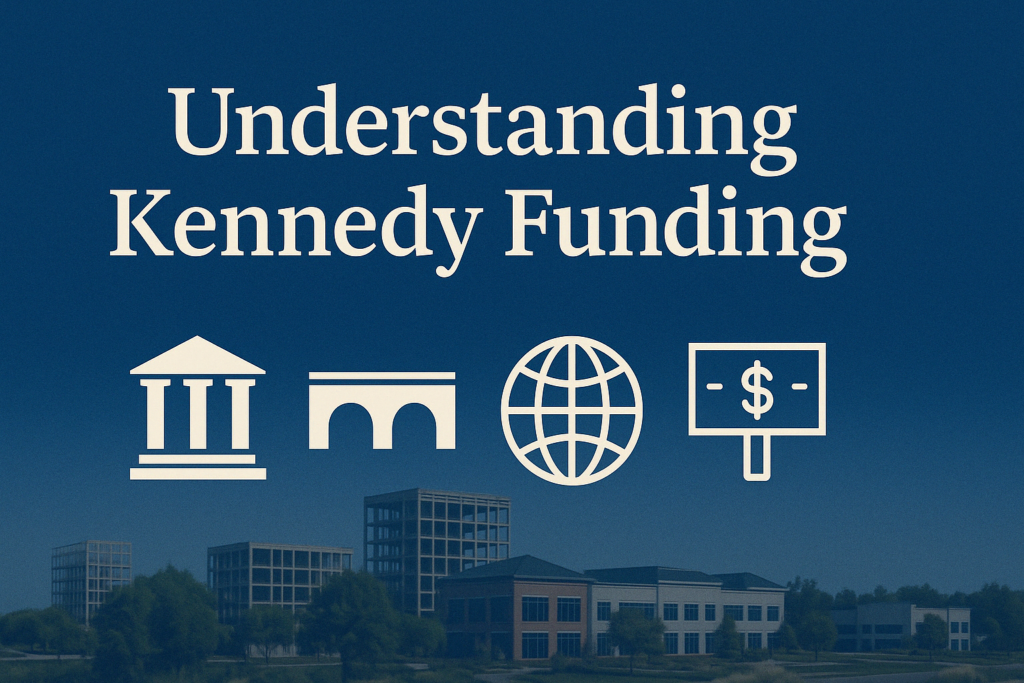
Visual depiction of concerns raised in the Kennedy Funding Ripoff Report and questions about its legitimacy.
Introduction
What Is Kennedy Funding?

Kennedy Funding is a well-known direct private lender that operates globally, specializing in asset-based commercial real estate loans. Founded in New Jersey, the company positions itself as a quick and flexible financing alternative for borrowers who may not meet traditional lending criteria. Their services primarily include bridge loans, land acquisition loans, and development funding. Unlike conventional banks that focus on credit history and borrower income, Kennedy evaluates the value and potential of real estate assets as collateral, which gives them an edge in speed and adaptability.Their target audience often includes real estate developers, entrepreneurs, and investors looking for fast capital—especially for non-traditional projects that might raise red flags at a bank. Kennedy Funding’s pitch revolves around quick closings, minimal bureaucracy, and a personalized approach to structuring deals. This appeals to clients who are under tight timelines or navigating complex zoning, legal, or approval processes.However, this alternative lending model also opens doors to potential disputes. Since deals are frequently based on subjective property valuations or unique circumstances, misunderstandings are more likely to arise. Over the years, Kennedy Funding has received mixed feedback. While some borrowers praise the speed and service, others claim miscommunication, hidden fees, and unfulfilled promises. These concerns often surface in consumer complaint platforms like Ripoff Report, where anonymous users describe negative experiences. As the lending world becomes increasingly digitized and reputation-driven, these online reports significantly influence public perception and investor trust in a company.
Why the Ripoff Report Matters
Ripoff Report is an open-access platform where consumers post unfiltered reviews and complaints about businesses. Unlike other review sites, it doesn’t moderate or verify posts, which means users can express grievances anonymously. This can be a double-edged sword. On one hand, it empowers consumers to share honest experiences. On the other, it opens the door for fake, exaggerated, or even malicious claims. Kennedy Funding has appeared multiple times on this platform, prompting potential clients to question the legitimacy and ethics of its operations.For businesses like Kennedy Funding, being listed on Ripoff Report can be damaging even if the complaints are not substantiated. Since Ripoff Report ranks well in search engine results, anyone researching the company will likely encounter these allegations early in their journey. From accusations of deceptive practices to frustration over unreturned fees or communication lapses, the platform hosts a variety of user experiences. Some stories appear legitimate and detail exact situations with dates and amounts. Others are vague or seem emotionally charged.
The presence of these complaints doesn’t automatically imply guilt. However, it indicates a pattern of dissatisfaction that deserves scrutiny. A few isolated issues can happen with any business, but recurring themes—like alleged misleading terms or loan denials after lengthy approvals—can signal deeper operational flaws. For borrowers seeking substantial funding, especially for million-dollar-plus projects, trust is everything. That’s why it’s crucial to analyze the Ripoff Report not as a final verdict but as a red flag that warrants deeper investigation and balanced judgment.
Understanding Kennedy Funding’s Business
Overview of Their Loan Services
Kennedy Funding offers a variety of loan products tailored to borrowers who struggle to obtain traditional financing. These include bridge loans, land loans, and development loans, all underwritten based on the asset’s value rather than the borrower’s financial profile. A core feature is their ability to close loans within days—an attractive option for clients facing tight deadlines or foreclosure threats.
Bridge loans, in particular, are Kennedy’s flagship offering. These short-term loans are intended to “bridge” financial gaps until long-term financing is secured. The company also funds land acquisitions for residential, commercial, or agricultural use, even if the land lacks infrastructure or permits. Their development loans help clients finance construction, property upgrades, and major renovations. What sets Kennedy apart is their willingness to engage with deals that banks deem too risky.
But higher risk comes at a price—literally. Kennedy’s interest rates are significantly higher than those of banks, and upfront fees can be steep. These terms are disclosed during negotiations, but not all clients understand the implications. This is where many complaints begin. Some clients feel they were misled about timelines or costs, while others report sudden denials after weeks of documentation. These inconsistencies contribute to the “ripoff” narrative and highlight the importance of reading fine print and seeking legal counsel before entering such agreements.
Target Market and Business Model
Kennedy Funding primarily serves borrowers operating in niche or distressed real estate markets. Their model caters to developers facing time-sensitive situations, such as tax auctions, rezoning deadlines, or property flips. By focusing on the asset instead of borrower credibility, Kennedy taps into a market that’s underserved yet lucrative. The company makes money through origination fees, high interest rates, and short-term repayment cycles, allowing it to fund more projects within a fiscal year.
Internationally, Kennedy extends loans in regions like South America, the Caribbean, and Canada. This global reach introduces diverse legal frameworks, increasing the complexity—and sometimes the risk—of each deal. Not surprisingly, the flexibility they advertise can also lead to misinterpretations. Clients unfamiliar with the nuances of asset-based lending might expect the process to mirror a traditional bank loan, only to find it’s much more rigid and transactional.
This model works efficiently when all parties understand the rules. However, when borrowers lack financial literacy or legal advice, they may perceive standard procedures as dishonest practices. For example, a denied loan after an initial agreement might be due to title issues or valuation discrepancies—not intentional deception. Still, without clear communication, frustration escalates and often ends up on review platforms. Kennedy’s business model relies on speed, efficiency, and calculated risk, but these same traits can alienate clients if not managed carefully.
Origins of the Ripoff Report
When Did Complaints Begin?
Complaints against Kennedy Funding began surfacing on Ripoff Report and other forums over a decade ago. The initial concerns revolved around delayed closings and high upfront fees that borrowers claimed were non-refundable, even when deals collapsed. Some users accused the company of approving deals verbally or via preliminary letters of intent, only to later back out citing due diligence issues. These early complaints set the tone for the online narrative that Kennedy Funding may be exploiting desperate borrowers.
As time passed, the nature of the complaints evolved but remained rooted in similar themes—lack of transparency, unmet expectations, and poor customer service. The digital age amplified these voices, with social media and search engine visibility making it easier for discontented clients to share their stories. In contrast, positive reviews, which are less frequently posted, often fade into the background.
The consistency in complaint themes suggests that communication, not necessarily corruption, may be at the heart of the problem. Many clients enter these deals under financial pressure and expect quick solutions. Any delays, setbacks, or changes feel like betrayal. The timeline of complaints also reflects periods of market downturns, which may have influenced both the company’s lending behavior and borrower desperation. Understanding this history helps paint a fuller picture of why Ripoff Reports against Kennedy continue to resurface.
Common Allegations Made by Clients
The most common complaints center around upfront fees, misleading terms, and poor communication. Many clients allege they were led to believe that funding was guaranteed after initial approval, only to be denied later during due diligence. In such cases, borrowers often say they lost thousands of dollars in appraisal, legal, or processing fees with no refund. Others complain about vague timelines or difficulty reaching representatives once paperwork is submitted.
Another recurring allegation is the bait-and-switch technique—where loan terms appear favorable at first, but shift significantly just before signing. Clients claim interest rates or collateral demands change without notice, leaving them with few options but to accept or walk away. In high-pressure financial situations, this can feel like extortion, even if it’s legally permissible under the agreement’s clauses.
Some also allege that Kennedy Funding uses generic approval letters as a marketing tactic, making borrowers feel their deal is solid when it’s still under review. This confusion contributes to feelings of being scammed. While not all these allegations are verifiable, their frequency and similarity make them worthy of attention. Regardless of legality, ethical business practice also includes managing expectations and maintaining transparent communication—areas where Kennedy Funding seems to have room for improvement.
Analyzing the Key Complaints
Claims of Misleading Loan Terms
One of the most serious complaints made against Kennedy Funding is the allegation of misleading loan terms. Many borrowers claim that the terms initially discussed differ significantly from those in the final agreement. For instance, interest rates, origination fees, or prepayment penalties may be altered later in the process, catching borrowers off guard. While some changes can result from due diligence findings or third-party appraisals, they are often perceived as bait-and-switch tactics by clients unfamiliar with private lending complexities.
Such discrepancies become even more problematic when the borrowers are already in urgent financial distress, relying on quick and favorable terms to salvage a project. The stress and time sensitivity can cloud judgment, leading clients to commit without thorough review. When these surprises emerge at closing or funding stages, clients may feel misled—even if the final documents legally permit such changes. Critics argue that Kennedy Funding must take greater responsibility in ensuring that clients fully understand terms before moving forward.
Transparency in communication is key, especially for high-stakes transactions. The responsibility doesn’t lie solely with the borrower; lenders should aim to foster informed decisions. Unfortunately, in some cases, Kennedy Funding’s aggressive approach is viewed as opportunistic, especially when dealing with borrowers who lack financial experience or legal representation. The result is a perception that the company capitalizes on urgency, leading to a recurring theme of “ripoff” in online forums.
Issues with Communication and Transparency
A frequent theme across Ripoff Reports about Kennedy Funding is poor communication. Borrowers often report a breakdown in contact once the application process begins, especially after submitting documents or upfront fees. In industries driven by timelines and deadlines, such silence can cause major concern. Some complain that calls and emails go unanswered for days, while others say they were passed from one representative to another without clarity or resolution.
This lack of communication becomes a bigger issue when loans are denied or stalled. Clients expect updates and explanations, particularly after paying for appraisals or legal evaluations. When they don’t receive those updates, frustration quickly turns into suspicion. Even if a loan fails to close for legitimate reasons—like property value discrepancies or title issues—borrowers feel abandoned and deceived.
Clear and consistent communication can prevent these perceptions. If expectations were better managed and updates shared more proactively, many of the complaints might not exist. While Kennedy Funding markets itself on speed and reliability, poor communication undermines that promise. A structured process for client engagement and status updates could significantly improve the company’s reputation. In the absence of that, many clients are left feeling confused and unsupported—feeding the negative online narrative.
Alleged Delays and Denials in Funding
Another major issue reported by clients is unexpected delays or outright denials late in the funding process. Several borrowers allege that after weeks—or even months—of back-and-forth, Kennedy Funding declined their loan at the last minute. By that time, these borrowers had already invested in paperwork, property inspections, and legal fees, only to receive no funding and no reimbursement. This understandably creates resentment, especially when the denial comes without a detailed explanation.
The challenge with asset-based lending is that funding is never truly guaranteed until all checks are cleared—property title, valuation, zoning compliance, and borrower documentation. Kennedy Funding does explain this to some extent, but many borrowers claim they were given a verbal “go-ahead” or term sheet that implied approval. When the deal falls apart, it feels like betrayal.
Additionally, international deals or land loans often come with extra layers of complexity—cross-border regulations, unclear land ownership, or political risks—that delay processing. Kennedy Funding takes pride in navigating these complexities, but clients unfamiliar with international lending nuances may misinterpret procedural delays as bad faith. In an era of online reviews and reputational scrutiny, such misunderstandings quickly become public grievances and damage trust.
Kennedy Funding’s Side of the Story
Company Responses to Accusations
Kennedy Funding has made efforts to address some of the accusations leveled against it online. The company states that it operates within legal boundaries and ensures that all terms are clearly disclosed in official documents before any loan is finalized. They argue that many complaints stem from borrowers who misunderstood the process or were ultimately ineligible due to issues uncovered during due diligence.
In public responses and media interviews, Kennedy Funding’s leadership has defended their practices by highlighting the complexities of private lending. They emphasize that each deal is unique and subject to numerous variables, including third-party appraisals and shifting market conditions. The company also insists that borrowers are informed of potential risks, and that all agreements are documented legally and transparently.
Kennedy Funding’s stance is that the Ripoff Reports often lack context or omit critical details, creating a one-sided narrative. They acknowledge that not every deal works out, but deny any intentional wrongdoing or fraudulent behavior. According to them, the negative reports are exaggerated by frustrated borrowers who failed to meet basic requirements or expected bank-like simplicity in a non-traditional lending model.
Public Statements and Legal Rebuttals
In addition to verbal responses, Kennedy Funding has issued formal statements and occasionally pursued legal remedies when they felt defamatory comments damaged their reputation. They have pointed out that Ripoff Report does not verify posts, and as such, false or malicious content often remains unchecked. In cases where clients posted egregiously false claims, Kennedy has sought legal counsel to demand takedowns or retractions, although success on such platforms is limited.
They also highlight the legality of their lending practices, including fee structures and risk assessments. Kennedy Funding argues that all borrowers are provided documentation outlining costs, collateral requirements, and timelines. They claim that any borrower entering a contract does so voluntarily and is advised to seek independent legal review. This legal protection is often buried in the fine print, but it underscores their belief that complaints stem from misunderstandings, not malfeasance.
Despite the negative reviews, Kennedy Funding continues to operate at scale, funding domestic and international projects. This suggests that many clients are either satisfied or see the benefits outweighing the risks. The company believes its long-standing presence in the market—dating back over 35 years—is evidence of its legitimacy.
Reviews from Satisfied Clients
While the negative reviews are loud, many clients also express satisfaction with Kennedy Funding, especially those familiar with real estate lending. Positive testimonials describe smooth closings, professional service, and fast turnaround times. Clients who understood the asset-based model from the start often found Kennedy’s services invaluable, particularly when traditional financing wasn’t an option.
Some borrowers successfully used Kennedy Funding to finance land acquisitions, complete stalled construction projects, or avoid foreclosure. They highlight the company’s ability to close in record time—even for complex, multi-million-dollar deals. These clients often came prepared with documentation and realistic expectations, and as a result, they had a better experience overall.
It’s worth noting that satisfied clients are less likely to post online reviews compared to dissatisfied ones. Therefore, the lack of positive noise shouldn’t automatically indicate a lack of positive experiences. Many real estate professionals quietly recommend Kennedy Funding within their circles, knowing that it caters to a specific, high-risk niche where few others dare to operate.
Ripoff Report: Fact vs Fiction
Are These Complaints Verified?
One of the challenges in evaluating the Ripoff Report is the lack of verification. Anyone can post a complaint, and once it’s live, it stays indefinitely—even if the issue is resolved. This means some of the claims against Kennedy Funding may be based on partial truths or misunderstandings. Without proper evidence or documentation, it’s difficult to determine which complaints are factual and which are exaggerated or outright false.
That being said, a consistent pattern in complaints should still be taken seriously. If multiple borrowers cite the same problems—unclear terms, delayed funding, poor communication—it suggests areas of improvement, even if the claims aren’t legally damning. Verified reviews on more moderated platforms like Better Business Bureau or Google Reviews may offer a more balanced view.
As always, readers should approach such reviews with critical thinking. No company is immune to criticism, especially one operating in high-stakes finance. But not every complaint equals a scam. Many issues could stem from unmet expectations, lack of borrower education, or genuine business disagreements. Understanding the difference is key to making informed decisions.
Genuine Grievances or Misunderstandings?
Most likely, the truth lies somewhere in the middle. Kennedy Funding’s aggressive business model and focus on speed can cause friction, especially when borrowers lack clarity. While some complaints are undoubtedly rooted in real frustration, many others seem to arise from a mismatch between borrower expectations and the realities of private lending.
A borrower may feel misled if they assumed verbal pre-approvals guaranteed funding, not realizing that due diligence is still pending. Similarly, a delay in closing might feel like a bait-and-switch when, in fact, it was triggered by a third-party appraisal or zoning complication. These are not scams—they’re common risks in real estate finance. But if not clearly communicated, they can leave clients feeling cheated.
Kennedy Funding could mitigate much of this by improving communication, setting clearer expectations, and publishing educational materials. A more proactive approach could turn frustrated borrowers into informed partners, reducing the volume and severity of future complaints.
Expert Opinions and Third-Party Insights
What Financial Experts Say
Financial analysts familiar with asset-based lending often acknowledge the complexity of firms like Kennedy Funding. Experts caution borrowers to thoroughly review contracts, seek legal advice, and budget for unexpected changes. They note that private lenders operate in a grey area that is less regulated than traditional banks—making education and preparation vital.
Several financial forums describe Kennedy Funding as “legitimate but tough,” praising its ability to close deals banks would never touch. However, they also warn that the company isn’t a fit for every borrower. It’s designed for high-stakes, fast-moving real estate deals, not small business loans or conventional mortgages. For the right borrower, it can be a lifesaver. For the wrong one, it can become a nightmare.
Independent Reviews and Ratings
On platforms like Trustpilot, Google, and BBB, Kennedy Funding holds a mix of ratings. While not always flattering, it shows a more moderated landscape than Ripoff Report. Some borrowers give 4–5 stars for responsiveness and flexibility, while others rate 1–2 stars due to miscommunication or denied loans. The variance underscores the importance of preparation, understanding, and aligning expectations before applying.
Comparing with Other Lenders
How Kennedy Funding Stacks Up
Compared to traditional banks, Kennedy Funding offers a faster and more flexible lending model. Their willingness to fund high-risk deals and lend on raw land or unpermitted properties puts them in a unique position. While banks require full documentation, excellent credit, and rigid protocols, Kennedy evaluates deals primarily on asset value. This opens doors for many borrowers shut out of the conventional system.
However, when compared to other private lenders, Kennedy Funding’s fee structure and communication practices have drawn criticism. Some competing firms are praised for offering more transparency and borrower education. Others might provide similar terms but with more personalized service or local expertise. Still, Kennedy Funding’s global reach and large deal capacity make it a go-to for experienced investors in niche markets.
Borrowers must weigh the pros and cons: the speed and flexibility Kennedy offers can be unmatched, but that speed sometimes comes at the cost of transparency or leniency. It’s crucial to compare not just rates and terms, but also the lender’s reputation, clarity, and responsiveness. Doing so helps determine whether Kennedy or another firm is the right fit for your project.
Red Flags to Watch in Private Lending
Private lending, by its very nature, carries risk—both for lenders and borrowers. That’s why recognizing red flags early is critical. Common warning signs include unclear loan terms, rushed agreements, demands for large upfront fees, and vague communication. In Kennedy Funding’s case, many complaints stemmed from such red flags, signaling the need for borrowers to proceed cautiously.
When a lender makes big promises with little documentation, or asks for money before offering a written term sheet, that’s a cause for concern. Similarly, if contact becomes irregular or inconsistent during the application process, it may indicate a disorganized or disreputable operation. It’s also wise to verify if the lender is registered or licensed and to research their litigation history if available.
In Kennedy’s case, while they’re not considered a scam in the legal sense, their aggressive approach may appear suspect to those unfamiliar with private lending. Borrowers should do their homework, read every document thoroughly, and never rely on verbal confirmations alone. Being proactive can prevent many of the issues seen on platforms like Ripoff Report.
How to Protect Yourself from Lending Scams
Tips for Verifying Loan Providers
Verifying a lender before entering into a deal can save time, money, and stress. Start by checking their credentials—confirm business registration, licensing, and any disciplinary history. Use verified directories or industry-specific organizations like the National Private Lenders Association (NPLA). A simple web search of the company name plus “scam” or “reviews” can uncover red flags.
Additionally, speak directly with a representative and ask detailed questions. Request a sample contract, review the terms, and look for hidden clauses. Real lenders won’t rush or pressure you. If anything feels off, get a second opinion from a lawyer or a financial advisor. Transparency and professionalism are key markers of a legitimate firm.
In Kennedy Funding’s case, their long-standing presence and successful deals speak to their legitimacy. However, that doesn’t mean every borrower experience will be smooth. Performing due diligence is still necessary. Ask for references, understand the total cost of borrowing, and prepare for worst-case scenarios before signing anything.
Red Flags in High-Risk Lending Deals
High-risk lending deals typically involve unique properties, short timelines, or distressed financial situations. These scenarios attract both reputable lenders and bad actors. A few common red flags include:
- Promises of guaranteed approval
- Pressure to wire funds quickly
- Vague or incomplete documentation
- No clear point of contact or frequent representative changes
Borrowers should document every conversation, ask for everything in writing, and avoid paying large fees without legal safeguards. Even with a legitimate lender like Kennedy Funding, protecting yourself from missteps is critical. Just because a lender has credentials doesn’t mean every deal is risk-free. Awareness and proactive engagement are essential tools for navigating the high-risk lending landscape.
Legal and Regulatory Insights
Is Kennedy Funding Under Investigation?
As of now, Kennedy Funding is not under any major public investigation by federal authorities or financial regulatory bodies. That said, it has faced legal disputes with clients over the years, most of which are civil in nature and pertain to contract disagreements. These are not unusual in the real estate lending world, especially when dealing with complex, high-value transactions.
The absence of criminal or regulatory action indicates that while Kennedy may have customer service and communication issues, its core operations are likely within legal parameters. However, this doesn’t negate the grievances of borrowers who felt mistreated or misled. Many issues, while not illegal, can still reflect poorly on a company’s ethics and client relationship strategies.
If Kennedy were to face regulatory scrutiny, it would likely revolve around disclosure practices, fee structures, or consumer protection claims. For now, their continued operations and deal flow suggest a functioning—if imperfect—business model.
Role of Consumer Protection Agencies
Consumer protection agencies play a vital role in regulating the lending industry, especially in identifying unfair practices. Organizations like the Consumer Financial Protection Bureau (CFPB), Federal Trade Commission (FTC), and state Attorney General offices investigate predatory lending, misleading terms, and improper collection methods.
Borrowers who feel defrauded can file complaints with these agencies. While platforms like Ripoff Report serve as public warning boards, regulatory agencies offer formal channels for legal recourse. They also collect data on recurring complaints, which can trigger audits or investigations if a pattern of abuse is found.
Borrowers dealing with Kennedy Funding—or any private lender—should document all communications and financial transactions in case intervention becomes necessary. Even if a loan isn’t completed, any signs of unethical behavior can be reported. This keeps the lending market safer for everyone.
User Testimonials and Case Studies
Real Stories from Borrowers
A wide range of borrower experiences paints a complex picture of Kennedy Funding. Some describe successful outcomes—like receiving funding within days for a critical land acquisition. Others tell stories of disappointment, citing broken promises or sudden denials. These firsthand accounts are crucial for understanding how Kennedy operates in real-world scenarios.
One borrower praised Kennedy for stepping in after multiple banks rejected their project. The loan closed within two weeks, enabling a commercial construction project to proceed. Another borrower, however, complained that they paid a $25,000 fee only to have their loan rejected for reasons they believed were unjustified. These contrasting stories underscore the importance of preparation, research, and legal review.
Mixed Reviews and Lessons Learned
The takeaway from these user stories is clear: Kennedy Funding is not for everyone. If you understand the risks, ask the right questions, and have proper legal guidance, the company can be a valuable partner. However, if you’re new to asset-based lending or assume it functions like a traditional bank, you may be setting yourself up for conflict.
The lessons are universal. Always read contracts. Always verify claims. Never rely on verbal promises. And most importantly, choose a lender whose practices align with your project’s risk tolerance and timeline. With this mindset, you can avoid the most common pitfalls and benefit from private lending—even with firms as controversial as Kennedy Funding.
Conclusion
Is Kennedy Funding a Scam or Not?
Kennedy Funding is not a scam. It is a legitimate private lender with decades of experience and a long list of completed transactions. However, it operates in a high-risk, high-reward space where borrower expectations don’t always align with reality. This disconnect has led to numerous complaints, particularly from clients unfamiliar with private lending protocols.
While some grievances on Ripoff Report appear justified, others may be the result of misunderstandings or poor preparation. Kennedy’s biggest weakness is arguably its communication process and the failure to educate borrowers upfront. This creates friction and mistrust, even when the company operates within legal and contractual limits.
If you’re considering a loan with Kennedy Funding, do your homework. Read everything, ask questions, and work with professionals. It’s not about whether the company is good or bad—it’s about whether it’s right for your specific situation.
Final Thoughts and Consumer Advice
Kennedy Funding offers a specialized service that many traditional lenders don’t. For experienced investors with complex deals and tight timelines, it can be a reliable ally. But for the unprepared or misinformed, it can become a financial headache. The Ripoff Report shouldn’t be the sole factor in your decision—but it’s a useful resource for identifying potential issues.
Be proactive. Ask for full terms upfront. Get everything in writing. Consult with financial and legal advisors before signing. And remember: just because a lender is fast or flexible doesn’t mean it’s always the best choice. In lending—especially private lending—caution, clarity, and commitment to due diligence are your strongest safeguards.
FAQs
Is Kennedy Funding a legitimate lender?
Yes, Kennedy Funding is a legitimate private lender specializing in asset-based loans for commercial real estate projects. However, some borrowers have reported issues like high fees and communication delays. It’s essential to thoroughly review loan terms and consult with a financial advisor before proceeding.
Why are there complaints about Kennedy Funding?
Complaints often revolve around high upfront fees, unexpected loan denials, and unclear communication. Some borrowers feel they weren’t adequately informed about the loan terms or processes. Conducting due diligence and asking detailed questions can help mitigate these concerns.
Does Kennedy Funding guarantee fast loan approvals?
Kennedy Funding advertises quick loan approvals, but experiences vary. Some borrowers report delays and extended processing times. It’s advisable to set realistic expectations and maintain open communication with the lender throughout the process.
What steps has Kennedy Funding taken to address complaints?
Kennedy Funding has stated efforts to improve transparency by clarifying fee structures and enhancing customer communication. They emphasize their commitment to ethical lending practices. Nonetheless, potential borrowers should independently verify all terms and seek professional advice.
How can borrowers protect themselves when dealing with Kennedy Funding?
To safeguard your interests:
1.Request detailed written loan terms.
2.Understand all fees and conditions.
3.Consult with a financial advisor or attorney.
4.Compare offers from multiple lenders.
5.Research reviews and testimonials to gauge others’ experiences.





